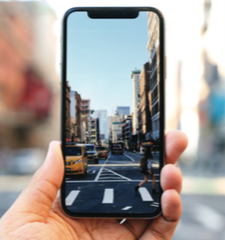Smartphones, love them or hate them they are now a critical business tool that enables a huge amount of work to be done almost anywhere anytime and we have come.
A long way since the humble smartphone hit the shelves. The first successful smartphone arguable was the blackberry, (or due to its addictiveness nicknamed “Crackberry”). Excellent device for keeping on top of those emails, but it was Apple that really stepped things up in 2007 when they launched the first iPhone. This became the benchmark.
Fast forward and what we have today really doesn’t compare to those early devices. With mobile data growing exponentially the smartphone today is truly a very powerful tool. We stream content to it, we consume media through them and of course we connect with each other through social media. These devices mean we are more productive while working remotely than was ever imagined.
So what’s in store for the smartphone this year?
Often new innovations in smartphones will be launched at events like CES (Consumer Electronics Show) and while not all of them hit the market it does give a measure of where the market is and what we are likely to see. Smartphone launches can be a bit like the automobile show where concept cars are displayed each year. The difference is, innovation in smartphone do tend to hit the market and quickly due to the still competitive global market
In the coming year new innovations by all account will centre around a couple of new designs. Firstly foldable devices are all the talk at the moment and Samsung seem to have given its greatest signal yet with the Galaxy X. The device will fold out to 7.3 inch (larger than the + devices but smaller than a tablet). Its folded size will be around 4.6 inch.
The challenge for manufacturers with foldable phones as well as flexible screens is the components need to be flexible- including the battery. Purportedly Samsung are looking at two batteries, one for the inner and then the other for the outer screen. This means the outer battery only needs to be used when the device is fully open.
The other big move in devices will be 5G capable devices. As some countries have moved or started to move to 5G devices will need to be capable of these new speeds. At the moment there are no devices, so it would appear the industry still sees this as an emerging market and this year will give us an indication of when manufacturers think the shift will come.
5G will enable faster downloads and more content to be streamed which may in its own way sprout new innovation around it, much in the same way fibre was able to develop streaming services like Netflix.
Augmented Reality functionality hasn’t taken off yet but many of the leading manufacturers have embedded the functionality into their software. Apple launched the iPhone X and later the XS with much fanfare around the AR function. The tape measure app that comes preloaded in iPhone is an example of AR practical use. Working with major companies Apple are trying to lead the market (and hence own it) with collaboration with businesses like Ikea.
The feeling is AR is not destined to stay within smartphone hardware. True AR will require additional equipment like headsets and glasses. But in the meantime, smartphones are developing this within their current designs and as mentioned some are collaborating heavily with industry players, particularly retailers.
Further evolution of biometrics with an improved fingerprint scanner. Developing fast is the on-glass fingerprint scanner. Real estate on a Smartphone is highly competitive (think why Apple remove Headphone Jack) and why everything is getting smaller. Personally, I think this will be one development that is likely to be the standard moving forward. If a manufacturer can re-proposition the space currently taken up with a scanner then they are surely going to do it. Why would they do that when there is reliable face ID recognition?
Because no one likes to have put their password into a phone and that’s what is inevitable you have to do if the face ID failures.
It will be interesting to see what the two main players Apple and Samsung launch this year. Samsung usually launch their flagship Galaxy device around March and Apple launches in September. CES is currently on again in Las Vegas, and it will be interesting to see what the other players in this market release there.
The Smartphone is one of the most useful business tools, it gives flexibility in work, it gives answers on the road and over the coming decade I’m keen to see what this will morph into and how this will enhance our lives. Perhaps it will become redundant by wearable or implanted devices, perhaps it won’t, but as we wrap up holidays with family and friends, one of its most useful functions at this time of year is the do not disturb function.



